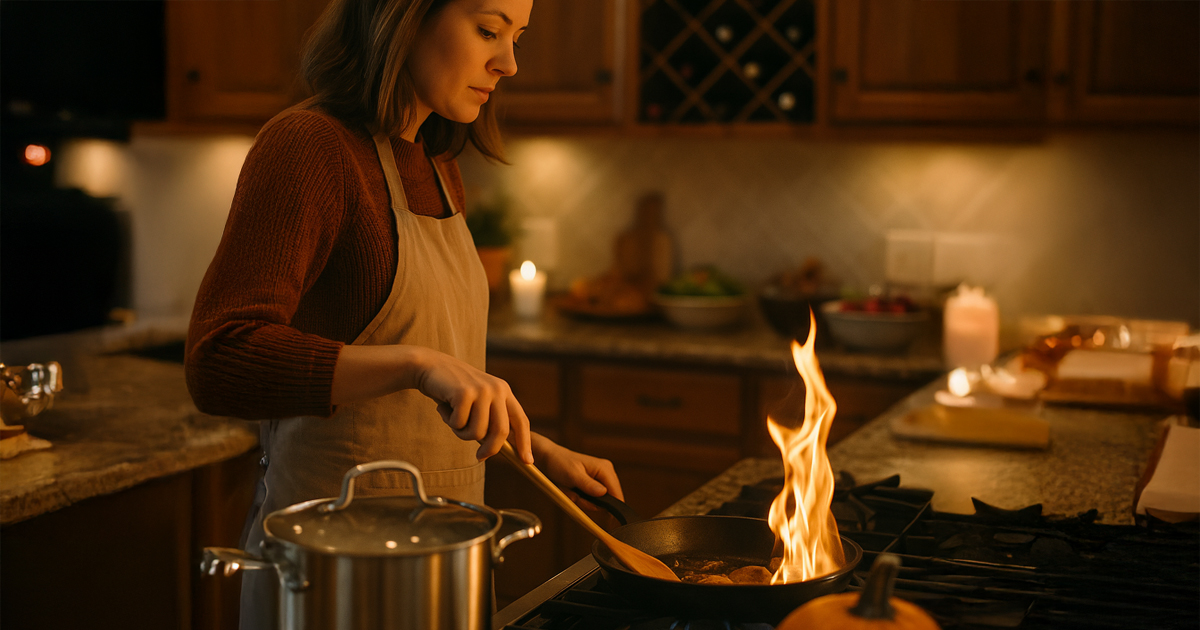Thanksgiving is a time for gratitude, family, and great food—but it’s also one of the most dangerous days of the year for home fires and preventable injuries. At The Floyd Law Firm PC, we care about your family’s safety, not just in legal matters but in daily life. By following a few simple precautions, you can ensure your Thanksgiving is remembered for laughter and togetherness, not for accidents or emergencies.
Thanksgiving Fire Statistics
According to research from the National Fire Protection Association (NFPA), Thanksgiving consistently ranks as the peak day for home cooking fires—more than three times the daily average. Christmas Day and Christmas Eve follow closely behind, with nearly twice as many incidents as a normal day. Unattended cooking remains the leading cause of cooking fires and related deaths. Overall, cooking accounts for more than half of all reported home fires, over a third of home fire injuries, and nearly one in six home fire deaths.
In 2023 alone, U.S. fire departments responded to an estimated 1,446 home cooking fires on Thanksgiving Day—388 percent higher than the daily average. About 80 percent of structure fires that occur on Thanksgiving are due to cooking, and those fires account for nearly 40 percent of civilian injuries. These statistics are a sobering reminder that most fires are preventable with mindfulness and preparation.
Cooking and Fire Safety
The kitchen is the heart of the home during Thanksgiving, but it can quickly become one of the most dangerous places if safety isn’t a priority. Always stay in the kitchen while cooking on the stovetop, and keep an eye on foods roasting in the oven. Fires often start in the brief moments it takes to answer a doorbell or get distracted by a conversation.
Keep children and pets at least three feet away from stoves, hot food, and cooking areas. Setting a “kid-free zone” can help prevent burns or accidents. Avoid wearing loose clothing or long sleeves while cooking, as these can easily catch fire. Keep items such as pot holders, dish towels, and packaging away from burners and heat sources. Using timers or smart devices can help remind you when food is on the stove or in the oven—especially when multiple dishes are being prepared at once.
If you plan to fry a turkey, do so outdoors, far from your home or any structures. Never fry a frozen or wet turkey; always ensure it’s fully thawed and dried before placing it in hot oil. Follow the manufacturer’s instructions carefully and have a fire extinguisher nearby just in case.
Food Safety
Remember that food recalls are unfortunately common around the holidays. Recent recalls have involved ground turkey and beef for E. coli and salmonella, as well as deli meats, cheeses, and vegetables for listeria contamination. It’s a good idea to check the USDA’s recall list on their website, or your local health department for updates before meal preparation begins.
If serving a turkey, avoid washing the turkey before cooking—it does not remove bacteria and can actually spread germs to nearby surfaces. Instead, wash your hands, utensils, and cutting boards thoroughly with soap and hot water after handling raw poultry.
Beyond fire safety, proper food handling is critical for a safe Thanksgiving meal. If cooking a turkey, use a food thermometer to ensure it reaches an internal temperature of 165°F, checking the thickest parts of the breast, thigh, and wing. Once the meal is over, refrigerate leftovers within two hours of cooking, and be sure to reheat foods to at least 165°F before serving again.
Safety for Children
Thanksgiving gatherings often bring excited little ones into busy kitchens, where hazards abound. Knives, hot liquids, and open flames can all pose dangers to curious children. Keep sharp tools stored safely out of reach, and be sure to supervise children closely around hot dishes, steaming pots, or freshly brewed coffee. Electric cords from mixers, slow cookers, and coffee makers should not dangle from counters, where small hands might pull them down.
Candlelight adds ambiance to a meal but can be risky—consider using flameless candles to eliminate the fire hazard altogether. Keep floors clear of clutter, toys, and bags to prevent trips and falls. If you’d like to include children in the celebration, give them age-appropriate tasks such as setting the table, folding napkins, or arranging cold food platters so that they can participate safely.
Safety for Pets
Pets are part of the family too, and they deserve a safe and healthy holiday. Many traditional Thanksgiving foods can be toxic to animals, including chocolate, grapes, raisins, small bones, onions, garlic, alcohol, nuts, and anything containing xylitol (a common sugar substitute). Fatty or spicy foods can cause digestive distress or lead to pancreatitis. Remind all of your guests not to feed pets from the table, no matter how tempting those begging eyes may be.
Large gatherings can also overwhelm pets. Designate a quiet space or room with their bed, water, and favorite toys where they can retreat from the noise and activity. Keep trash bins securely covered, and make sure electrical cords are out of reach. Never leave pets unattended near open flames or space heaters. If traveling for the holiday, take extra precautions with the use of harnesses or carriers and allow plenty of time for water and bathroom breaks along the way. Having your pet microchipped is always a good idea, or at least have identification information and your phone number on their collar.
Home and Travel Safety
Thanksgiving safety extends beyond the kitchen. Check your smoke alarms on every level of your home and make sure fire extinguishers are accessible and functional. Be cautious with space heaters, keeping them at least three feet from anything flammable and turning them off before leaving the room or going to bed.
If you’ll be traveling or spending long hours away from home, lock all doors and windows before you leave. Ask a trusted neighbor or friend to collect your mail and packages to make your home appear occupied. On the road, practice defensive driving, avoid distractions, and never drive under the influence. Planning for a designated driver or arranging a rideshare in advance can definitely save lives.
The flu season formally begins in October and can last as late as May, and flu cases typically rise as people travel and gather indoors during November, with the highest numbers of flu cases reported in the winter months (December, January, and February). It’s important to take care of your health and those around you. Wash your hands frequently, cover coughs and sneezes, and consider wearing a mask in crowded spaces such as airports, malls, or trains.
A Season for Gratitude and Care
Thanksgiving is a time to cherish what matters most—family, friends, and community. With a little preparation and mindfulness, you can prevent fires, foodborne illness, and injuries to your loved ones—both two- and four-legged.
Since 1973, The Floyd Law Firm PC has proudly served South Carolinians through life’s challenges. Whether your needs involve a personal injury, family matter, estate planning, or other legal concern, our team combines years of experience to provide sound guidance and effective solutions.
Stay safe, stay thankful, and have a wonderful holiday season.
More Information
National Fire Protection Association (NFPA) – Thanksgiving Fire Safety Information




